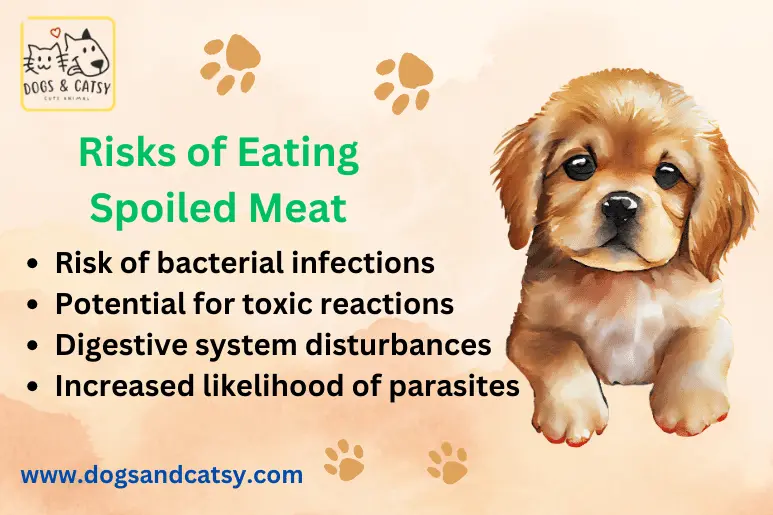4 Shocking Reasons Why Dogs Should Avoid Spoiled Meat
When it comes to our furry companions, the question of whether dogs can eat spoiled meat often crosses the minds of pet owners. It’s a different ball game when it comes to their digestive process compared to ours. You might wonder if it’s safe to feed them meat that’s gone bad. Let me assure you, it’s highly recommended to avoid doing so at all costs. Spoiled meat can harbor harmful bacteria that can cause significant issues in your dog’s stomach. In some cases, it may even warrant an emergency visit to the veterinarian.
Can Dogs Eat Spoiled Meat?
Dogs should never eat spoiled meat as it poses significant health risks. Consuming spoiled meat can lead to food poisoning, causing symptoms like vomiting, diarrhea, and severe stomach pain. Always ensure your dog’s food is fresh to keep them safe and healthy.
Can dogs get food poisoning from spoiled meat?
Dogs, though having robust stomachs, can suffer severe reactions from eating spoiled meat. Their digestive systems can handle many contaminants, but spoiled meat can contain harmful bacteria like Clostridium botulinum, which causes botulism.
Symptoms of botulism include muscle paralysis, weakness, drooling, constipation, and eye inflammation. Feeding dogs spoiled meat, even if they show no immediate symptoms, is dangerous and requires prompt veterinary attention.
To ensure your dog’s health, always dispose of spoiled meat properly and avoid giving them any food that could be contaminated.
Protecting Your Pooch: Say No to Spoiled Meat
As a responsible pet owner, I’ve been in situations where I found my dog eyeing a tempting piece of spoiled chicken. Just last night, or rather in the early morning hours, my furry friend tried to feast on it.
While I was asleep, he had his eyes on it the entire time. I quickly told him to stop, emphasizing that it wasn’t safe for him. I knew better than to give in to those puppy dog eyes.
Later in the evening and even tomorrow, he might have tried to dispose of it himself if I hadn’t snatched the container away and hidden it out of his reach.
After all, I didn’t want it to go to waste. But when it comes to the safety of our canine companions, we must be firm and say a resounding “NO” to feeding them spoiled food, whether it’s just a day old or two.
Also read: Is 30 degrees too cold for a husky
Understanding the Risks
When it comes to our beloved pets, the question of whether dogs can eat spoiled meat often arises. Many pet owners wonder if feeding their dogs slightly spoiled or processed meats will have any ill effects.
Dogs, with their short gastrointestinal (GI) tracts, tend to process food quickly. However, it’s important to understand that this doesn’t prohibit harmful pathogens from taking root and flourishing.
In the realm of raw dog food, you often hear about the risks associated with feeding dogs raw or undercooked meat, like salmonella and E. coli. The rule remains clear: if the meat is clearly rotten, moldy, discolored, or has a fierce smell, I wouldn’t recommend feeding it to your furry friend. Spoiled meat can cause significant GI troubles.

Dietary Habits and Adaptations
Feeding dogs a consistently healthy diet generally strengthens their immune systems, helping them to occasionally handle foods that might otherwise be problematic.
However, their digestive systems may still struggle with certain changes, particularly with raw meats.
- Digestive Sensitivity: Even minor deviations in diet can cause significant digestive upset, which can be unpleasant and messy for both the pet and the owner.
- Dietary Changes: Switching suddenly from dry kibble to raw or cooked foods can disrupt the normal digestion process in dogs. While some dogs can eat various foods without apparent issues, others might find it difficult to adjust.
It’s crucial to consider a dog’s regular diet and how they’ve historically responded to new foods before introducing them to something different, such as spoiled meat.
Generally, spoiled meat is not recommended for dogs as it can contain harmful bacteria like salmonella and E. coli, leading to severe gastrointestinal issues such as vomiting and diarrhea. Always prioritize safety and stick to high-quality, fresh foods for your dog’s health.
Variability in Tolerance
The ability of dogs to tolerate spoiled or raw meat varies significantly. Some dogs may manage it without any issues, while others could suffer from upset stomachs or more serious health problems.
- Observing Dietary Reactions: It’s important to carefully observe how your dog reacts to different types of food, especially when introducing new items like spoiled meat. If any adverse symptoms occur, consulting a veterinarian is crucial.
- Diet Consistency: Transitioning between different types of food such as raw, cooked, and kibble can pose challenges for many dogs.
Feeding spoiled meat to dogs is generally not advisable. Providing a well-balanced, healthy diet is the best strategy to ensure your pet’s health and to prevent gastrointestinal complications.
Always consider the specific dietary needs and past food reactions of your dog and seek veterinary advice when making significant changes to their diet.
Also read: Occiput dog guide
The Nature of the Beast
Dr. Kara, a veterinarian with expertise in pet care, suggests that the answer lies in their nature. While dogs may have a tolerance for spoiled meat, it’s not an ideal choice.
Their robust digestive system can handle certain challenges, but it’s always safer to prioritize clean and safe food for your furry friend. Keep in mind their ancestral roots and their preference for fresh, unspoiled meals – it’s a part of what makes them the fascinating creatures they are.
Understanding Canine Digestion
Dogs, as descendants of wolves, have been eating a variety of foods, including some rotten meat, since day one. Their digestive system, however, is quite different from ours.
While we may cringe at the thought of eating spoiled food, dogs have evolved as predators with the ability to target sick or injured animals and even diseased meat. Throughout millennia, they’ve been listed as both scavengers and predators, conditioned to consume what might make us humans sick.
The Thriving Scavengers
In today’s clean and sanitized society, it’s easy to forget that comparing the digestive happenings of a human and a dog is like night and day.
Dr. Kara, a veterinarian, reminds us that history tells us that the dog’s ancestors were scavengers and predators, quite far from the lapdogs that might carry a handbag today.
Whether you have a Chihuahua or a wolf, the instinct to prefer fresh meat over tinned food or to chew on a bone remains deeply ingrained in their DNA. It doesn’t matter how domesticated they’ve become; the wild spirit still lingers.
Understanding Dogs’ Eating Habits
Dogs have unique dietary habits that are more complex than they might appear. Their digestive system, equipped with high levels of stomach acid, allows them to digest a range of foods that humans would find unpalatable.
Whether it’s roadkill or an old piece of steak, dogs generally handle such foods without visible discomfort.
- Roots in Survival: This eating behavior is deeply ingrained in their survival instincts. Dogs are not selective about their food in terms of freshness; they focus on the nutritional value it offers. This survival instinct even explains why some dogs engage in coprophagia (eating feces), a trait from their ancestral survival tactics.
- Veterinary Advice: Despite their ability to digest these items, allowing dogs to eat whatever they find, especially if it’s spoiled or potentially harmful, is not advisable. Even dogs that are regularly treated for parasites can acquire worms from ingesting contaminated substances.
In summary, while dogs’ robust digestive systems enable them to eat a variety of foods, it is crucial to monitor their diet closely. Feeding them spoiled or dangerous items can pose health risks, underscoring the need for careful dietary management to ensure their well-being.
Also read: Do dogs get period cramps
Understanding My Dog’s Unique Eating Preferences
Owning a Labmoron has opened my eyes to the eclectic palate of my dog, who treats virtually anything that’s remotely edible as a delicacy.
Whether it’s scavenging through riverbank underbrush or eagerly participating in a struggle for week-old picnic leftovers, my dog finds immense joy in consuming what most would consider inedible, from rotting apple cores to sun-baked barbecue remnants.
- Dog’s Philosophy on Eating: My Labmoron operates under the philosophy of “If it goes down, it stays down,” willing to reattempt eating anything that he regurgitates. Commands like “come” and “sit” may work, but saying “Don’t eat that, it’s disgusting,” only makes him eat faster. Despite the odd nature of his eating habits, they seem to have minimal adverse effects on him.
Despite the unconventional eating habits, I’ve grown to appreciate my dog’s instincts. He has demonstrated time and again that his robust digestive system can handle a wide variety of foods, from frosting to raw meat.
Trusting his dietary choices has become easier as I’ve observed his resilience and minimal digestive issues. This unique perspective on feeding has taught me to embrace his natural inclinations, knowing his iron stomach can handle it.
FAQs
What Happens if a Dog Consumes Spoiled Food?
When considering whether dogs can consume spoiled meat, it’s critical to prioritize their health and safety. Dogs may naturally scavenge and have strong appetites, but eating spoiled food, such as rotten meat, can lead to serious health issues.
Spoiled meat can cause gastroenteritis, manifesting in symptoms like severe diarrhea, fever, and vomiting. In more extreme cases, ingestion of such food can lead to critical conditions including loss of motor control, hypothermia, and shock, conditions collectively referred to as garbage toxicosis.
Given these risks, it’s essential for dog owners to closely monitor their pets’ diet and prevent them from eating potentially harmful spoiled foods to safeguard their well-being.
Can Animals Safely Consume Spoiled Meat?
The question of whether dogs can eat spoiled meat hinges on their unique digestive systems and natural survival instincts.
While humans might fall ill from spoiled meat, many animals, especially predators and scavengers, have evolved to digest such food safely.
Dogs, for example, use their keen sense of smell to determine if meat is still consumable, despite being spoiled by human standards. This ability reflects their adaptability and survival tactics in the wild, where fresh food is not always available.
Why Do Dogs Have a Taste for Rotten Meat?
Dogs’ propensity to consume spoiled or rotten meat originates from their ancestral roles as predators and scavengers, possessing a digestive system robust enough to handle what would typically sicken humans.
This evolutionary trait enabled them to survive on carrion and diseased animals, making the most of available resources. While unappealing to humans, this behavior underscores dogs’ remarkable adaptability and deep-rooted survival instincts.
Can dogs tell if food is spoiled?
Dogs have highly developed senses of smell and taste, which are vital in discerning the edibility of food and detecting potentially toxic substances, including spoiled or rotten items.
These abilities have been honed over millennia, highlighting the special bond between dogs and humans. Despite their sometimes questionable food choices, it’s crucial to trust their instinctive judgment on what is safe to eat.
Their innate skill in distinguishing between harmless and dangerous foods underscores their reliability in determining suitable consumption.
How Long Does It Take for a Dog to Get Sick from Spoiled Food?
The time it takes for a dog to show signs of illness from eating spoiled food can vary widely, typically ranging from a few hours to a couple of days.
Factors like the type of food consumed and the dog’s overall health play significant roles. If your dog eats something questionable and starts to exhibit symptoms like vomiting or diarrhea, it’s crucial to seek veterinary care promptly.
Can a Dog Recover from Poisoning on Its Own?
When dogs ingest potentially poisonous substances, the risk to their vital organs, especially the liver and kidneys, is significant.
While they possess a remarkable capacity for recovery, the severity of the poisoning often dictates the pace and success of their recuperation. Supporting them with a bland, easily digestible diet and plenty of rest is crucial, but professional veterinary care is often necessary to ensure a safe and complete recovery.
Here is some visual glimpse of Can dogs eat spoiled meat:







